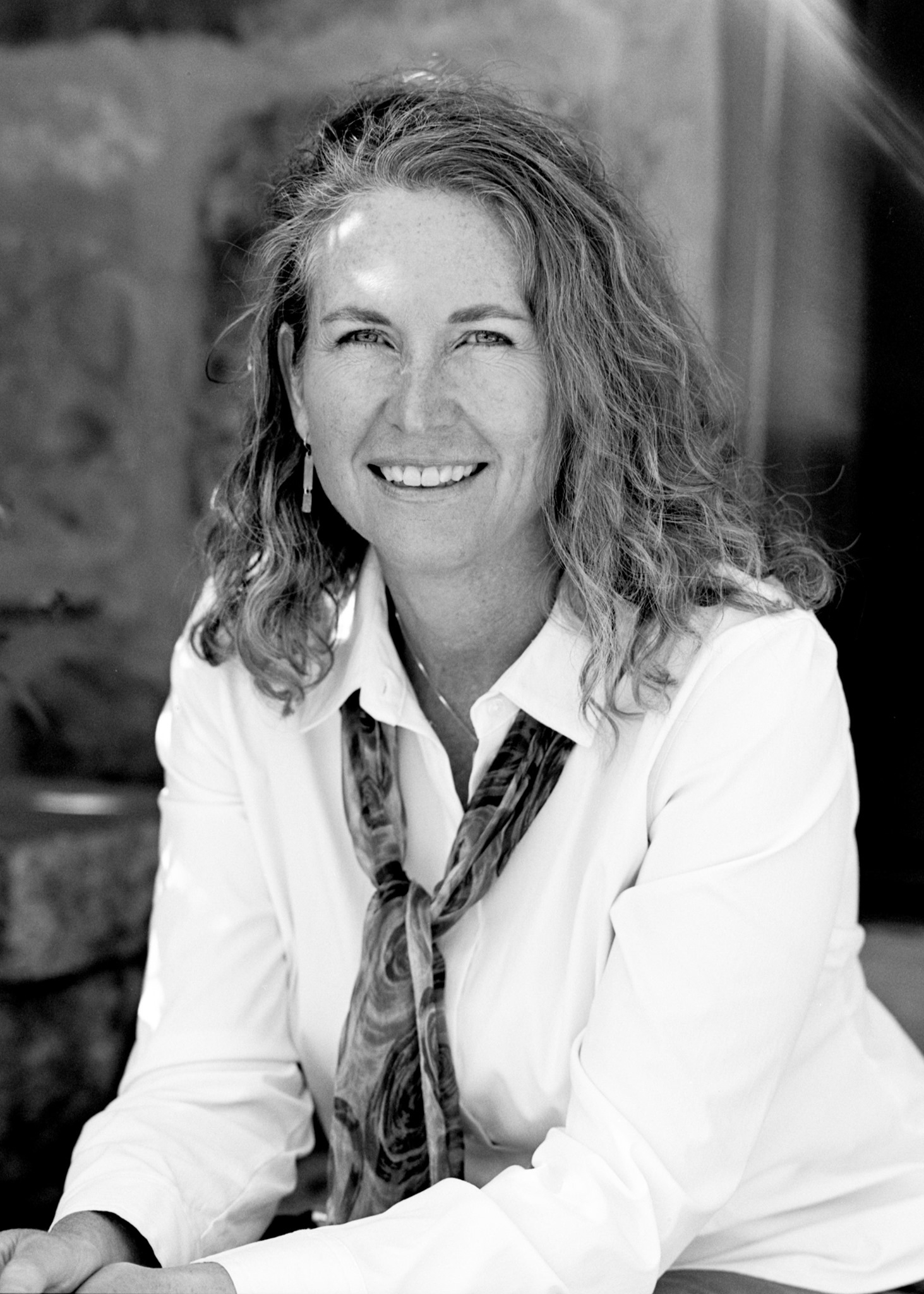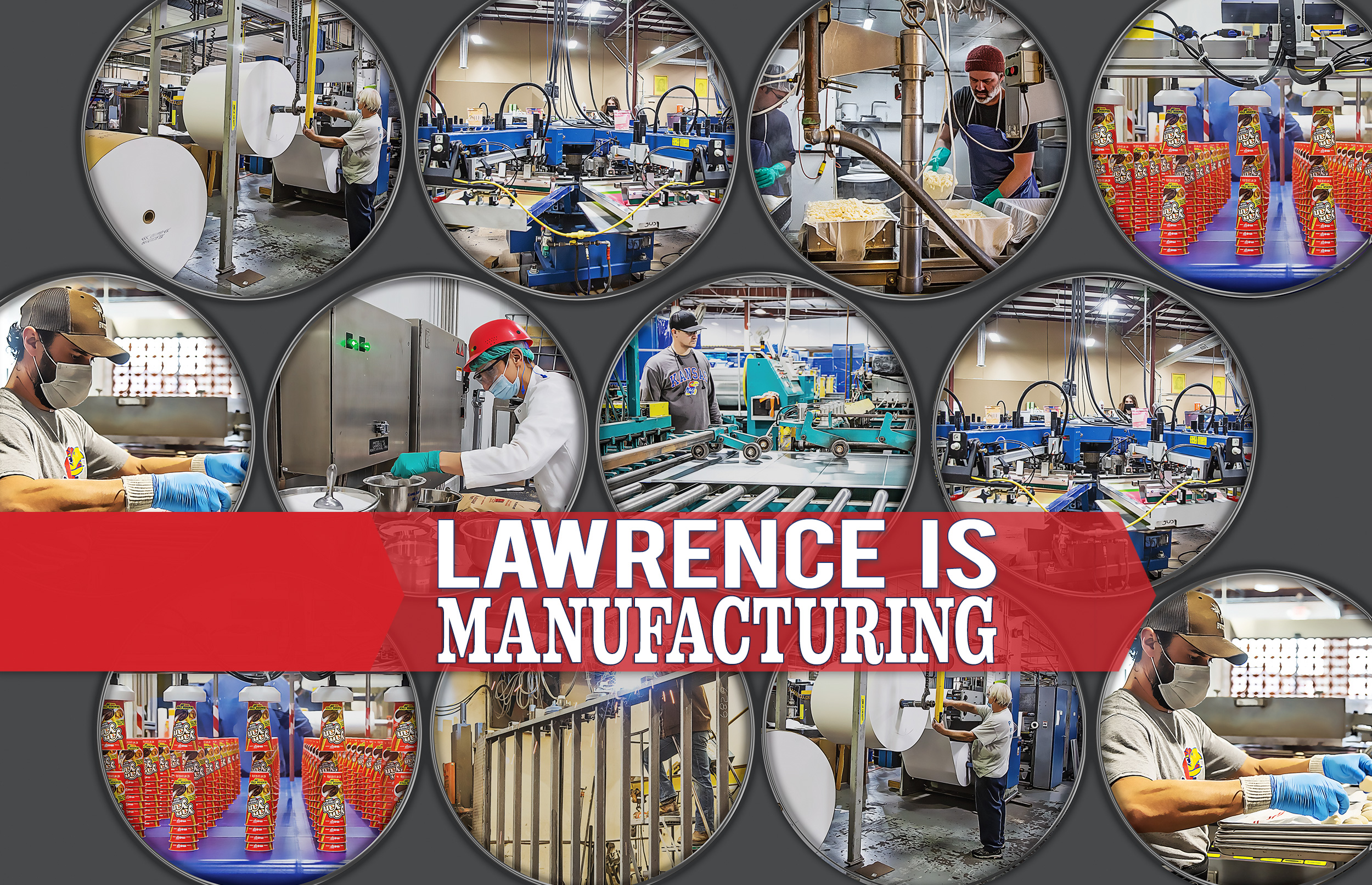| story by | |
| photos by | Steven Hertzog |
| OPEN A PDF OF THE ARTICLE |
Lawrence manufacturers create local value by producing their products right here.
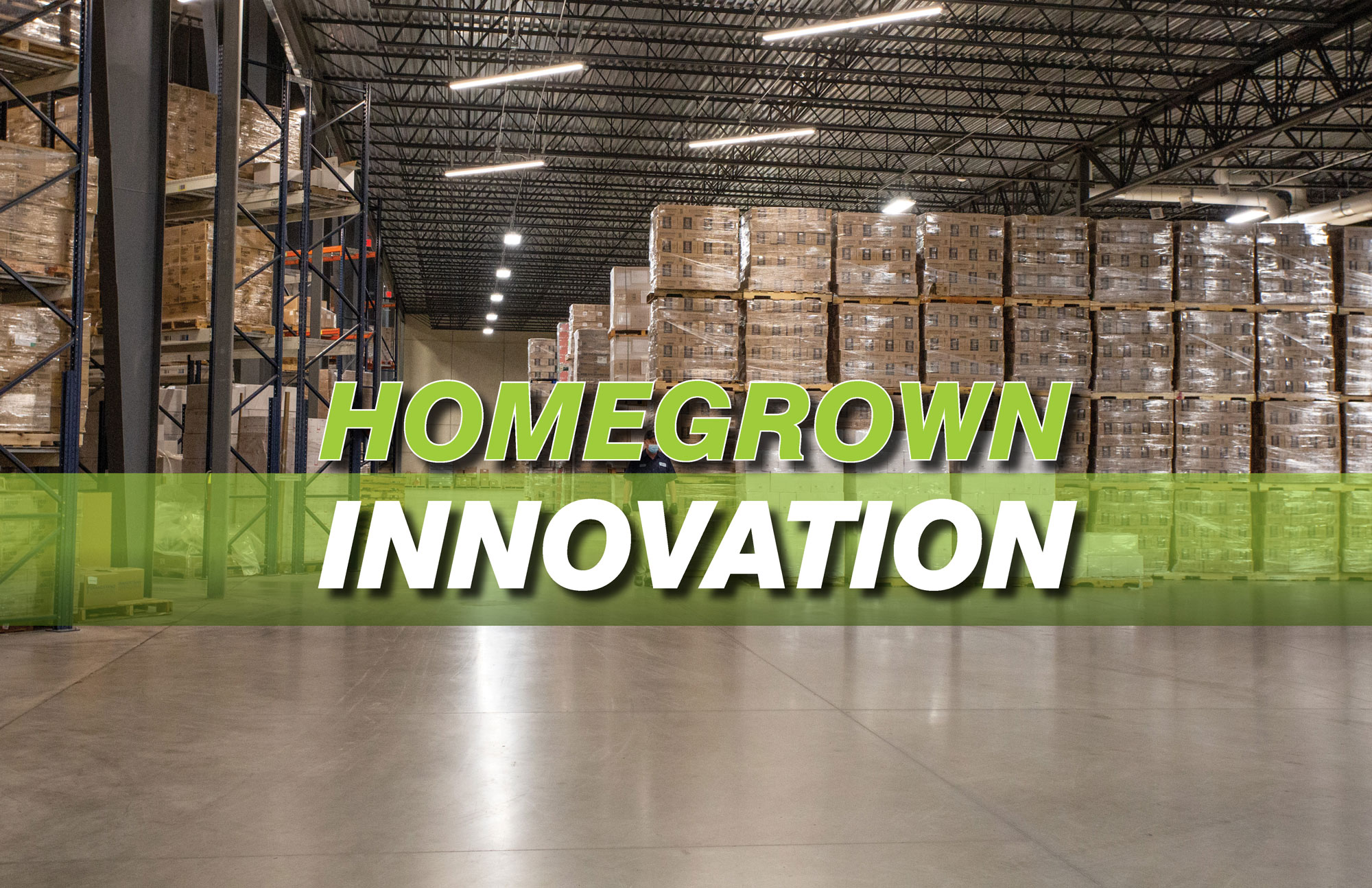
New warehouse at Grandstand Glassware & Apparel
Lawrence isn’t usually thought of as a manufacturing town, so it’s startling to discover how many everyday products are produced here. Companies big and small underpin the local economy as they make plastic to-go cups, dog kibble, souvenir pint glasses and more, often while leading the way in technological innovation, environmental sustainability and workforce development.
“A lot of people find it surprising how important and how vital it is,” says Steve Kelly, vice president of economic development at the Lawrence Chamber/Economic Development Council of Douglas County. “Quite a number of manufacturers in this community have a significant impact on the economy.”
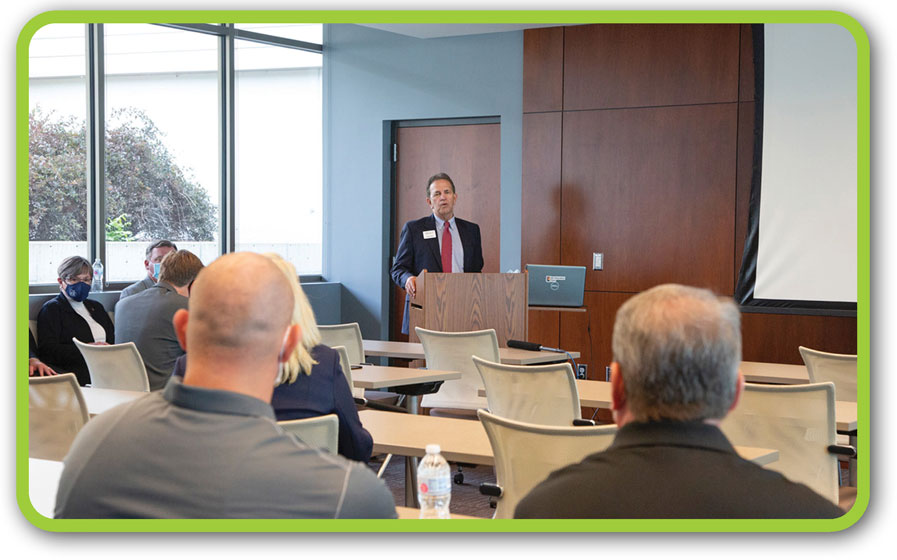
Steve Kelly, VP of Economic Development Lawrence Chamber/Economic Development Council of Douglas County
The proof is in the numbers. Manufacturing employs almost 5,000 people in Douglas County, according to Kansas Manufacturing Solutions’ 2021 Manufacturing in Kansas Report. Companies also spend on raw materials and services, pay city and state taxes, and donate time and resources to numerous nonprofits and agencies. All that resonates through the region’s economy, helping to stabilize it by balancing the larger education, health care, retail and hospitality sectors.
“Different sectors of the economy wax and wane on different schedules,” Kelly says. “Sometimes when one is up, the other is down or vice versa. Diversity helps even it out.”
That’s never been more true than in the past year and a half, when COVID-19 shutdowns devastated restaurants, retail stores and other businesses in Lawrence. Manufacturers have also faced challenges, particularly disruptions to labor and supply chains, but they’ve overall been able to maintain employment and output.
“They were agile, made adjustments and implemented safety protocols, and demand for goods was strong, which benefited the local economy,” Kelly says. “A lot of our companies have been really very strong throughout the pandemic.”
Berry Strong
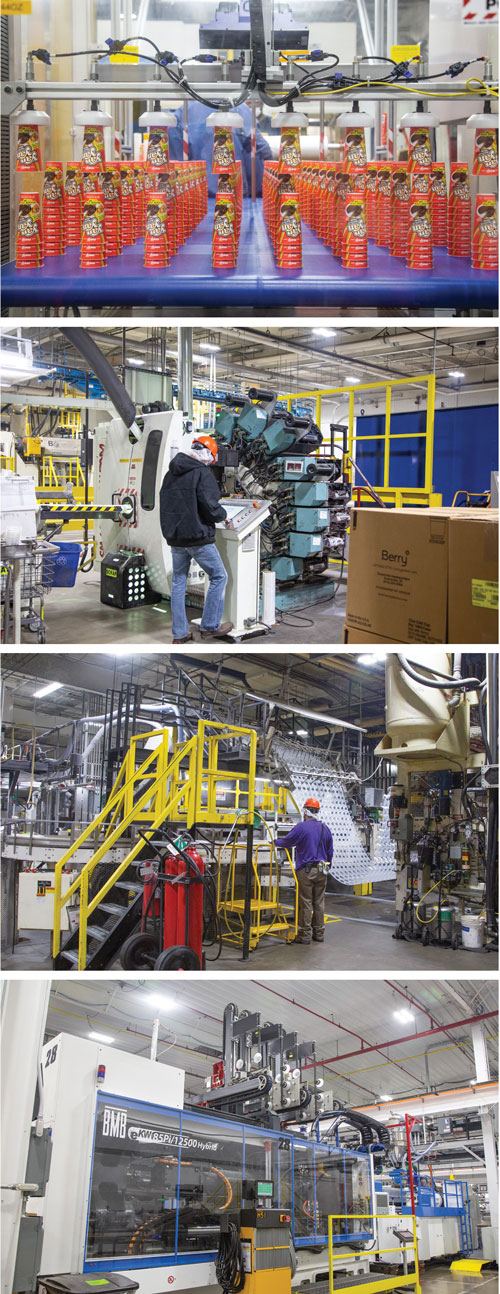
Berry top to bottom: Injection molding with an In Mold Labeling (IML) process used to produce dessert/snack containers; Dry offset printing with 8-color decorating capability; Production of thermoform drink cups for the quick serve restaurant and convenience store markets; Production of frozen food packaging in an 850 ton injection molding machine with robotic part handling.
Among them is the publicly traded Berry Global Inc., which entered the Lawrence market 25 years ago with the purchase of Packer Plastics, a drinkware maker that opened here in 1969. Berry uses injection molding, thermoform production and dry offset printing to make, decorate and distribute everything from ice cream and margarine packaging to plastic drink cups in its 440,000-square-foot plant in Lawrence and a 560,000-square-foot warehouse near Lecompton.
“In almost every case, it’s a turnkey manufacturing process here,” says Ross Freese, engineering manager at the company’s Berry Plastics unit in Lawrence. “We talk frequently about going from pellet to pallet with the products we produce,” referring to the polypropylene pellets that are the base material for most products.
It’s not just about making things, though. It’s about making them as sustainably as possible, says Jeff Mann, Berry Global’s executive vice president for innovation and sustainability. Its marquee example is a clear plastic cup that Berry developed and is now ubiquitous in restaurants, convenience stores and food-service outlets. It’s made from polypropylene, a thermoform polymer that requires less material and energy to manufacture, emits fewer greenhouse gasses and is easier to recycle.
“We launched that technology here in Lawrence” in 2006, says Mann, who notes that Berry holds more than 30 active patents in the drinking-cup category alone.
Designing a more sustainable cup fits well into Berry’s overall “30 by 30” strategy, which aims to use 30 percent recycled or renewable resin plastics by 2030. The company is also working to develop more efficient recycling technology and is collaborating with recycling facilities and food-service companies such as Wendy’s to further that goal.
“It’s all about keeping valuable resources in the loop and keeping them in their highest value form,” says Diane Marret, Berry’s sustainability director for consumer packaging, North America.
The same goes for Berry’s most valuable resource: people. The company sponsors internships and teacher “boot camps” to highlight opportunities, and recruits from area high schools and colleges. Employee programs (referred to internally as “Berry University”) include corporate online training, paid tuition to technical and junior colleges, and a leadership training curriculum developed in partnership with the Dwayne Peaslee Technical Training Center, in Lawrence.
Berry is currently expanding its production facility, which will add about 85 jobs and bring the number of employees in Douglas County to 950. Of those, about 60 have been with the company for 25 years and three for more than 50, explains Freese, himself a 33-year veteran who’s proud of how the company has grown in Lawrence.
“We have had a really strong growth trajectory for the 25 years we’ve been a part of Berry,” he adds. “There’s a lot of long-tenured, really committed people working here at the facility.”
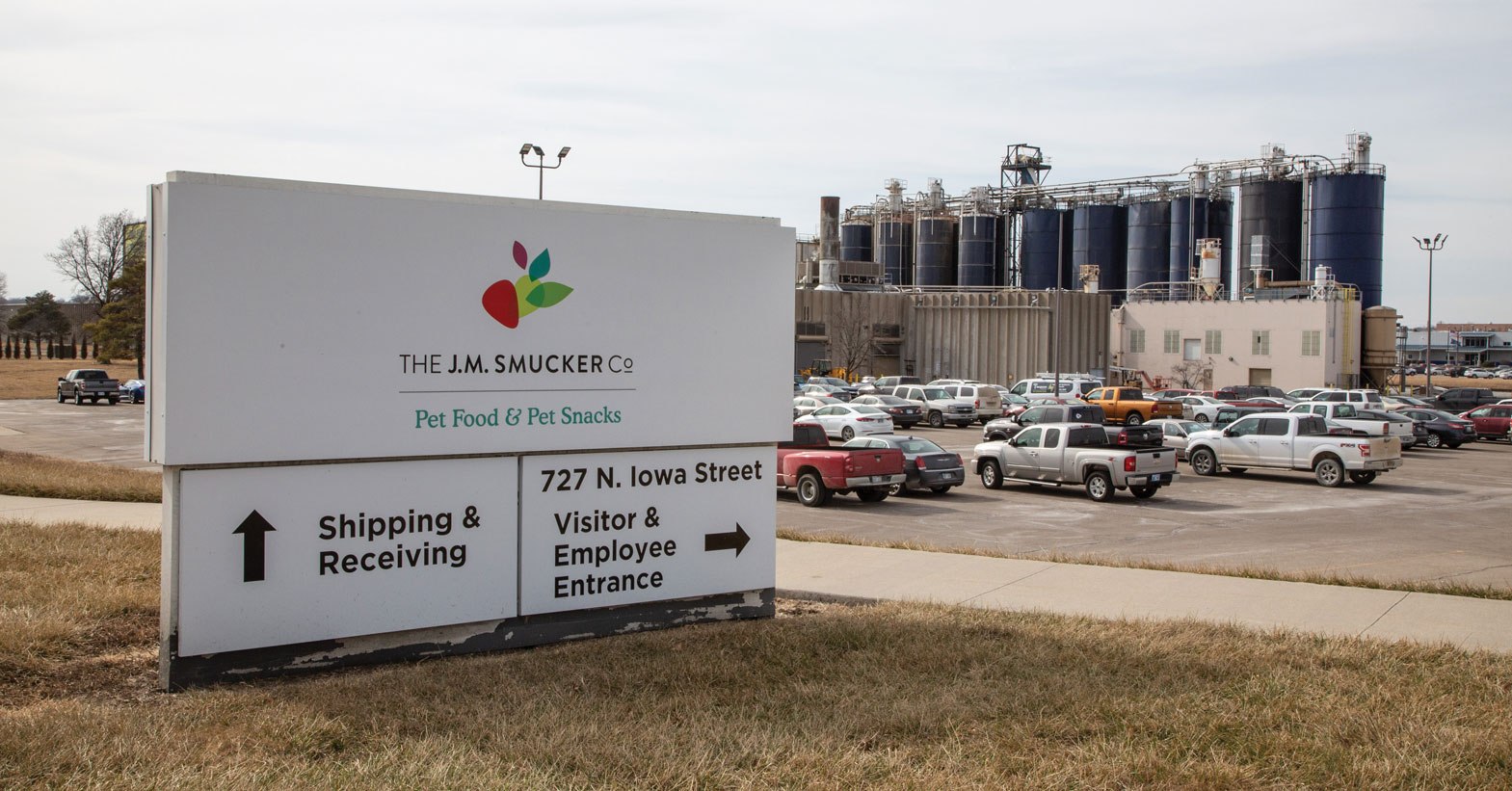
Exterior of The J.M. Smucker facility in Lawrence
Keeping Pace With Dog Food Demand
The same could be said of J.M. Smucker Co., a publicly owned company with more than 140 employees in Lawrence. The plant opened in 1978 and began producing dog food three years later. J.M. Smucker bought it in 2015 and has continued to make capital investments, often using local contract construction labor and buying Kansas-built equipment.
Its 236,000-square-foot manufacturing and warehouse facility now produces about 2 million pounds of Kibbles ’n Bits and Gravy Train dry dog foods daily. It’s a start-to-finish process that turns raw ingredients into dog food that’s then packaged, palletized and distributed.
That’s proved no easy feat in recent years, when the “pandemic puppy” boom upped demand, and supply chain disruptions roiled the industry. Still, “Our team has done an incredible job of managing through these challenges to continue to keep products on shelf,” plant manager Taylor Yoest says.
And they did it while helping J.M. Smucker meet its 2020 environmental impact goals, he explains. The plant diverted waste from the landfill; moved to a more efficient and effective method of dry cleaning during operations, which reduced water usage; and lowered overall greenhouse gas emissions by using reverse osmosis filtering and heat-reclaim systems to improve its steam generation process.
Giving back to Lawrence remained important, too. J.M. Smucker sponsors the University of Kansas School of Mechanical Engineering Senior Capstone Project and supports Peaslee Tech and other agencies, nonprofits and programs.
“We are very proud to be a part of the Lawrence community and appreciate the far-reaching support we have received from community leaders and residents,” Yoest says. “It is important to us that we reciprocate that support.”
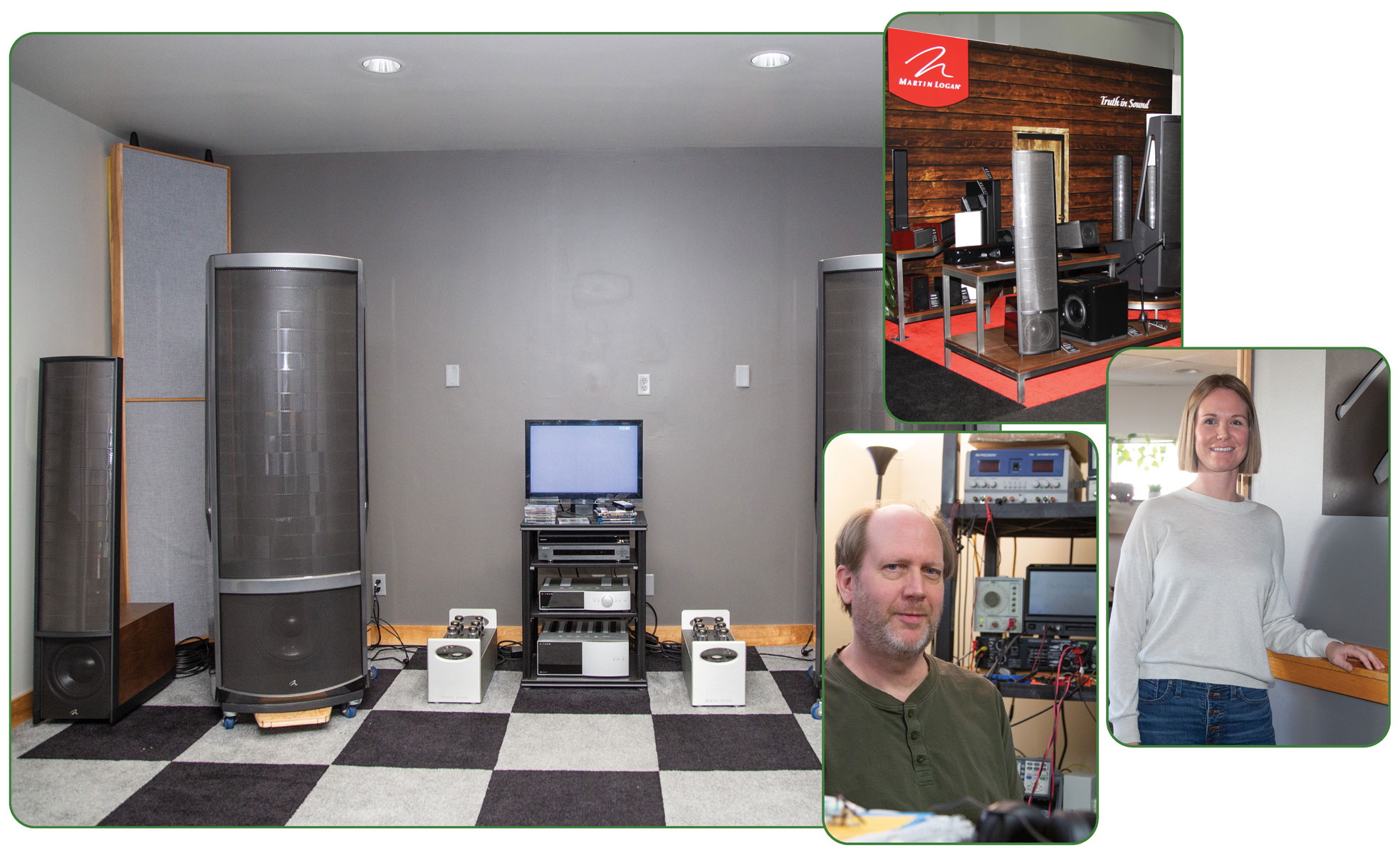
Speakers by MartinLogan; Head engineer for MartinLogan Joe Vojtko; Director of Inside Operations & General Manager Meaghan Lohmeyer.
Staying Local After the Sale
When a hometown manufacturer sells to a bigger company, the hope is that production will remain in place. That’s what happened with Berry Global and J.M. Smucker. The story of MartinLogan, a high-end speaker company, unfolds a little differently.
MartinLogan founders Gayle Martin Sanders and Ron Logan Sutherland met in the 1970s and began selling their electrostatic speakers in the 1980s. It was an entirely new take on speaker technology, one that uses a thin diaphragm sandwiched between two perforated grids instead of the voice coil typically used in dynamic speakers. Combined with MartinLogan’s curved panels, the speakers produce cleaner, more complete sound.
“Electrostatic speakers produce a three-dimensional sound,” says Meagan Lohmeyer, MartinLogan’s director of inside operations and general manager. “It sounds much the way it does when it’s being recorded.
“Nobody else was doing it,” nor are they now, she says. “It really is a proprietary technology.”
The Lawrence-based company quickly grew—so quickly that in 1990, Inc. Magazine named MartinLogan one of the 500 fastest-growing privately owned companies in the U.S. That success caught the attention of ShoreView Industries, and the private equity firm bought MartinLogan in 2005.
In 2019, industry veteran Scott Bagby bought MartinLogan, Paradigm Electronics (which Bagby had founded) and Anthem Electronics from ShoreView. Production was consolidated in Canada, a move that pared MartinLogan’s Lawrence location back to 16 employees.
Within that small footprint, though, lies the heart MartinLogan’s unique culture and creativity, Lohmeyer says. The in-house design, engineering, accounting, finance, inside sales and operations staff remain in Lawrence and, from here, guide the brand’s continuous evolution with the support of its parent company.
“For us, it was a really big win,” she says. Paradigm “recognizes that although we’re manufactured in their facility (in Canada), they can’t replicate what we do here.”
MartinLogan has maintained what she describes as a healthy, encouraging and positive environment during the pandemic. The company initially furloughed all but four employees, but then brought them all back as at-home work patterns and stimulus checks combined to increase demand for home stereo systems. Lohmeyer expects that to continue.
“Because we come to the table with such a unique technology and as long as people want to listen to music the way it was recorded,” MartinLogan’s business model is sustainable, she says. “What we do here is something known all around the world. I would think that would make Lawrence proud.”
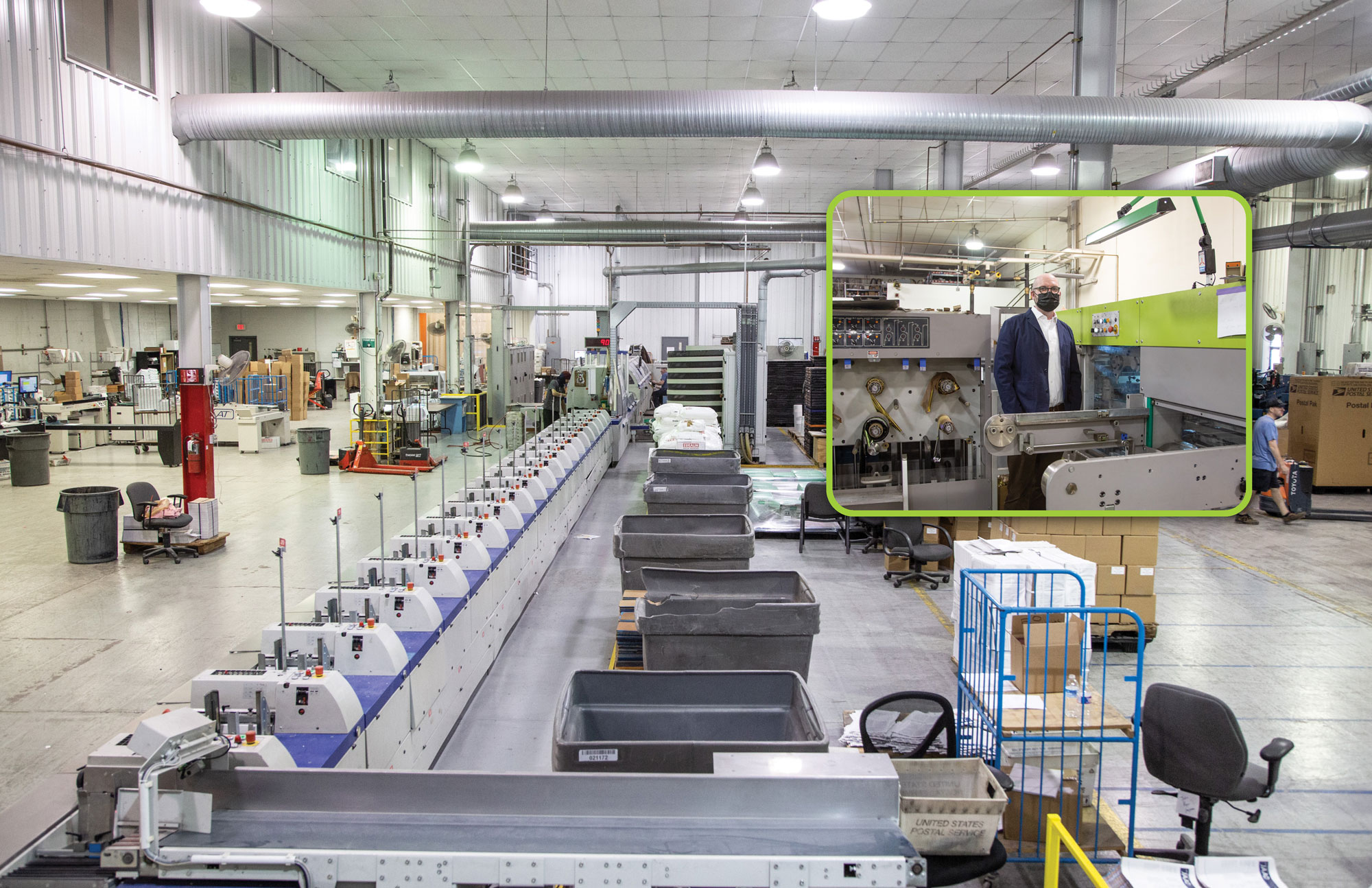
Bindery area of the plant floor. Allen Press offers both saddle-stitched and perfect bound binding options in-house. The production floor, including the bindery, is approximately 75,000 square feet (Inset) Mark Kohlhase, CEO, is pictured by the Brausse Die Cutter and Foil Stamper.
Lawrence-Proud
Allen Press is similarly Lawrence-proud. Founded in 1935, the East Lawrence mainstay’s 160 employees share a single goal: to help clients distribute information as quickly and accurately as possible.
“We make sure those two are always compatible,” says Mark Kohlhase, who took the helm as CEO in July 2021. “That’s what drives our system and our enhancements. We aren’t sacrificing one for the other.”
Core businesses include full-service print production for publications (including this one), trade printing and digital production, and it strives to find innovative ways to deliver those products. The company added die-cutting and foil-finishing technology after realizing that bringing those processes in-house would allow it to more quickly and cheaply deliver the custom-shaped advertising inserts, 3-D print effects and other finishes customers wanted.
Allen Press also offers marketing services, multichannel advertising sales programs and professional, nonprofit association management services, as well as publishing services for scholarly societies, university presses and nonprofit associations. That last combines editorial processes with technology that enables rapid dissemination of information, something that Kohlhase says proved essential during the early days of the pandemic.
Some of Allen Press’s scholarly journal partners were already focused on infection research, and they “really put a premium on getting manuscripts through the content-management process and making them available to other researchers as quickly as possible,” he explains. “Then we had to make it easy to find those materials in terms of discoverability.”
Allen Press is equally focused on boosting internal efficiency, and the company was already transitioning to Microsoft Teams and “bulking up” its data infrastructure when the spread of COVID-19 pushed both staff and clients to begin working remotely, Kohlhase continues. Other back-office system improvements made in recent years include installation of Kodak InSite, a prepress portal for managing artwork submission and approval, and EFI Enterprise software to streamline its workflow and better analyze potential revenue and cost-savings opportunities.
“It’s really a soup-to-nuts solution for handling data and information,” he says. “It provides continuity from developing a cost estimate for a customer all the way through planning how that piece is going to be manufactured.”
For all the tech, Allen Press is fully aware of its reliance on a natural resource: paper. It offers Forest Stewardship Council (FSC) certified paper and participates in PrintReleaf, a program that calculates how many trees were harvested for a print product and replants an equivalent number.
Allen Press also recycles 100 percent of its paper, aluminum, corrugated cardboard and other byproducts, which adds up to 270,000 pounds of material each month, according to a company press release.
“We do whatever we can to make sure we’re using those materials as responsibly and as efficiently as possible,” Kohlhase says.
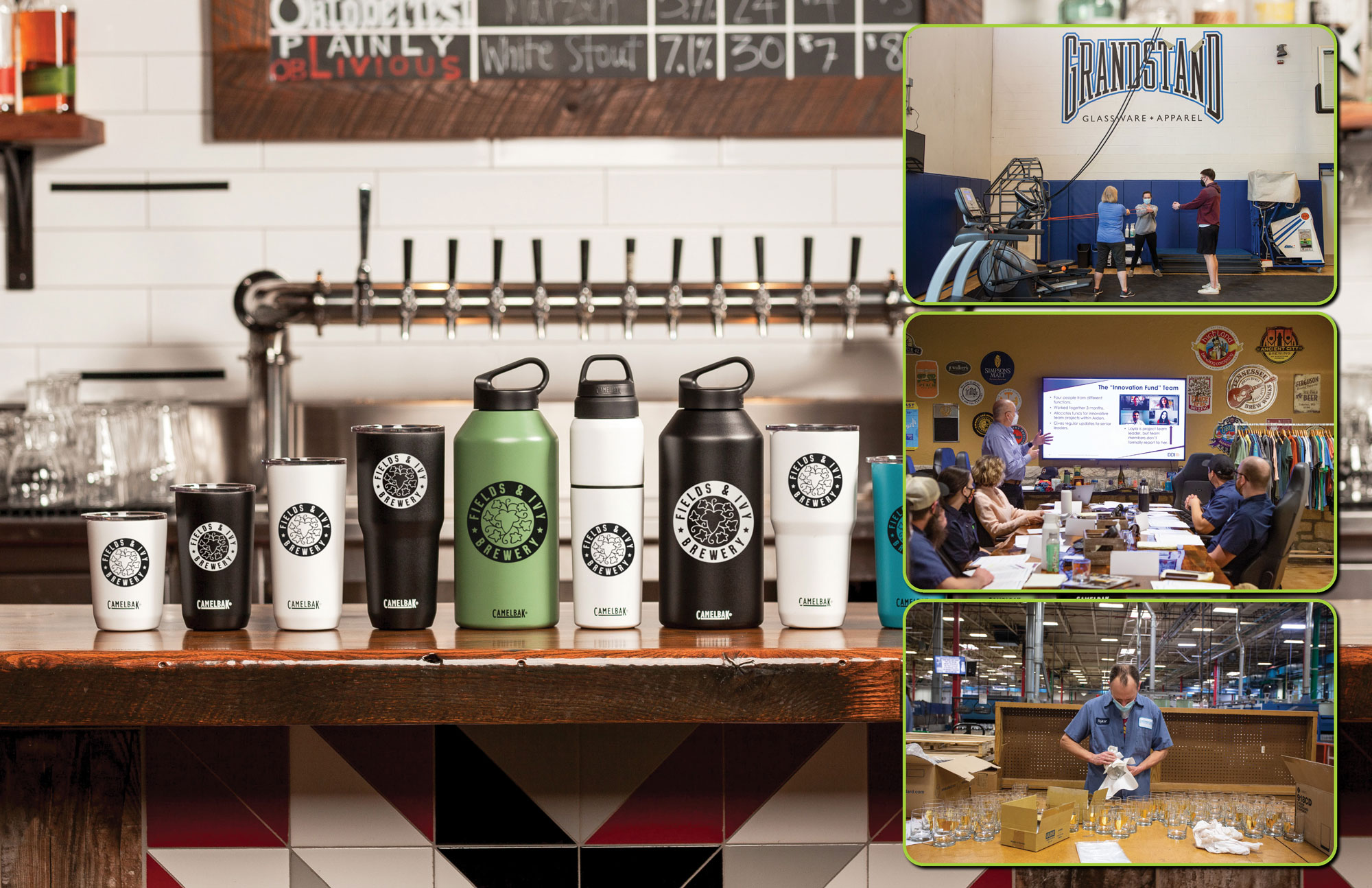
Water bottles designed in partnership with Camelbak; Top to Bottom: Grandstand employees work out in their facility gym with personal trainer Thomas Bachert; Employees at Grandstand attend an innovation workshop; Warehouse employee cleans glassware before being packaged for shipping.
Entrepreneurial Power
With its 87-year history, it’s easy to forget that Allen Press was once an entrepreneurial start-up. Lawrence is still rife with such activity, and it’s essential, the Chamber’s Kelly says.
“Companies started by entrepreneurs are really, really important,” he continues. “We take a lot of pride in a company that’s started here. It’s a critical piece of the business makeup of any community.”
One example is Grandstand Glassware & Apparel, a screen printing and design company that launched in 1988 and now has 205 employees and more than 10,000 customers. More than half are craft breweries; the rest are distilleries, wineries and other craft-beverage producers, owner Chris Piper says. Grandstand sells apparel, drinkware and licensed merchandise, including some in partnership with German glassmaker Rastal and CamelBak, which is known for water bottles and other hydration gear.
Grandstand also has an in-house creative agency called 88 Design Group, which helps customers integrate merchandise with their marketing goals. That was key in 2020, when merchandise became a lifeline for breweries, distilleries and other beverage businesses that had to shutter on-premise retail operations. Grandstand kept pace with demand and was even able to add 100,000 square feet to its facility in 2021 in the East Hills Industrial Park.
The company also recently created a position for an innovation manager, who holds monthly meetings to evaluate challenges and opportunities; launched a revamped website; started a leadership training program for employees in collaboration with Johnson County Community College; and changed its mission statement to reflect a combined focus on people and innovation.
“We talk about innovation, not only from a technology standpoint but a process standpoint. Whatever it is, why are we doing it that way? Is there a better way to do it?” Piper asks. “I’m a huge believer in each day wanting to get a little better.”
![]()


